#Fanny Cornforth
Explore tagged Tumblr posts
Text
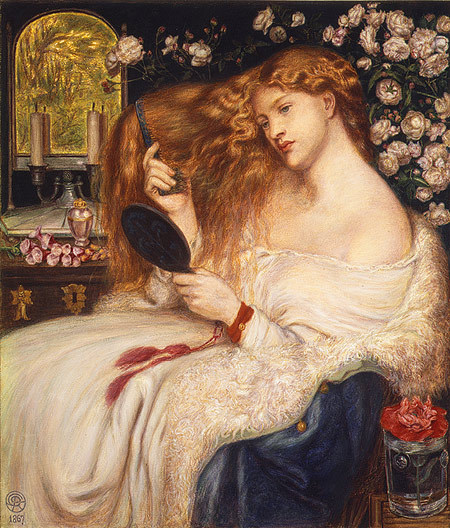
Lady Lillith (1866-68) - Dante Gabriel Rossetti
Modelling in this piece is Fanny Cornthorth, who Rossetti had repeated affairs with. Naming the piece after Lilith is a reference to the sexual nature of their relationship.
Unlike Eve, Lilith was made from the same soil as Adam, not his rib. As a result, she refused to be subservient to Adam and ended up leaving him and the garden of Eden. She became a symbol of sexual promiscuity and sin.
“She represents the New Woman, free of male control, scourge of the patriarchal Victorian family,” - Virginia M. Allen, historian.
In some Jewish traditions, mothers tie red string to their newborns wrist to ward off lilith. In this depiction of Lilith, she has tied a red hibbon to her own left wrist as if embracing her own 'sinful' nature.
7 notes
·
View notes
Text

Looks like Fanny's getting in on the boop action, too.
#ive spent way too much time booping today#but i will continue to boop#desperate romantics#aidan turner#dante gabriel rossetti#fanny cornforth#boop#StellyGif
19 notes
·
View notes
Text
Poet and Painter
Until 24th September 2023, Tate Britain is hosting an exhibition about the radical Rossetti family, focusing on their attitudes to art, love and lifestyles. Arguably, Dante Gabriel Rosetti is the most famous of the siblings, and his paintings make The Rossettis a remarkable exhibition. It has been over twenty years since Rossetti’s artwork has been on display in retrospective fashion, and it is a…
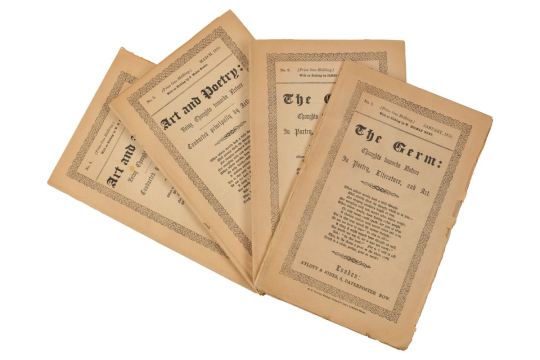
View On WordPress
#alcoholic#Alexa Wilding#art#Beata Beatrix#Bight&039;s disease#Bocca Baciata#Christina Rossetti#Dante Gabriel Rossetti#Ecce ancilla domini#Elizabeth Siddal#Exhibition#Fanny Cornforth#Ford Madox Brown#Jane Burden#ko-fi#Maria Rossetti#mental health#patreon#poem#poetry#Pre-Raphaelite Brotherhood#Rossetti#tate britain#the annunciation#The blessed damozel#the rossettis#William Holman hunt#William Morris#William ROssetti
1 note
·
View note
Text
dated circa 1860s
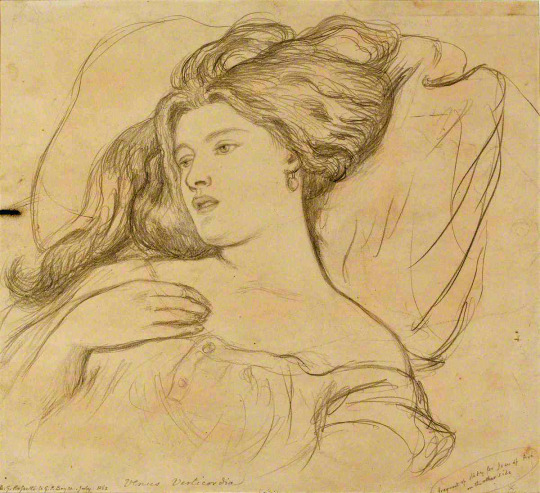
Fanny Cornforth Dante Gabriel Rossetti (1828–1882) The Fitzwilliam Museum
#vintage#antique#dante gabriel rossetti#study for Joan of Arc#circa 1860s#1800s#19th century art#fanny cornforth was Rosetti's muse and posed for him from 1860s until the end of his life in 1882
271 notes
·
View notes
Text

Bocca Baciata (Lips That Have Been Kissed)
Artist: Dante Gabriel Rossetti (English, 1828–1882)
Date: 1859
Medium: Oil on panel
Collection: Museum of Fine Boston, Boston, Massachusetts, United States
Description
Fanny Cornforth (1835-1909), born Sarah Cox in Sussex, England, modelled frequently for Rossetti, becoming not only his muse and companion, but an artistic collaborator on many of his paintings of the early 1860s. Cornforth is indeed the sitter for this small yet striking panel, long thought to mark a point of transition from Rossetti’s earlier medieval-inspired work, to what the artist himself characterized as a “rather Venetian aspect.” His more painterly handling and opulent palette render Cornforth’s lush copper locks, gilded jewelry, and plump, pursed lips sensually captivating. Yet, the physical immediacy of her positioning so near the picture plane is undercut by the psychological distance implied in her oblique gaze. In depicting her idealized sensuality, Rossetti drew on 16th-century Venetian precedents, as exemplified in the work of Titian. While “Bocca Baciata” presents a departure from the narrative complexity of Rossetti’s earlier work, it maintains firm literary connections. The title references a line from the “Decameron,” written by 14th-century Italian author Giovanni Boccaccio: “Bocca baciata non perde ventura, anzi rinnuova come fa la luna” (“The mouth that has been kissed loses not its freshness; still it renews itself even as does the moon”). Rossetti inscribed this verse, with subtle variations in spelling, on the back of the panel.
#painting#bocca baciata#oil on panel#pre raphaelite art#pre raphaelite brotherhood#oil painting#fine art#artwork#woman#copper red hair#necklace#rose#apple#costume#flowers#window ledge#earrings#beauty#aesthetic#pre raphaelite movement#english culture#english art#dante gabriel rossetti#english painter#european art#19th century painting#museum of fine arts boston
44 notes
·
View notes
Photo

Dante Gabriel Rossetti, (1828–1882), “Lady Lilith”, 1872, oil on Canvas. English poet, illustrator, painter, and translator. Pre-Raphaelite Brotherhood and Symbolism.
“Lady Lilith is an oil on canvas painting by Dante Gabriel Rossetti first painted between 1866 and 1868 using his lover Fanny Cornforth as a model, the work being altered in 1872 to show the face of Alexa Wilding. The painting is currently on display at the Delaware Art Museum”.
#dante gabriel rossetti#lady lilith#1872#oil on canvas#oil painting#painting#art#english artist#symbolism#pre-raphaelite#delaware art museum#long hair#woman#portrait#mirror#flowers#public domain
57 notes
·
View notes
Text

Aurelia (Fazio’s Mistress)
Artist: Dante Gabriel Rossetti (English, 1828–1882)
Date: 1863-1873
Medium: Oil paint on mahogany
Collection: Tate Britain, London, United Kingdom
Description
This subject is taken from the fourteenth-century Italian love poetry that Fazio degli Uberti wrote to his Lady, Agniola of Verona. Rossetti had translated and published it in his Early Italian Poets in 1861. The woman is contemplating her beauty in a mirror as she plaits her hair, inviting admiring looks from both her suitor, Uberti, and contemporary viewers. Rossetti’s lover Fanny Cornforth modelled for the picture. In its combination of warm colour, rich glazes and contrasting textures the painting shows the influence of Renaissance Venetian painters, particularly Titian whom Rossetti greatly admired.
#painting#female figure#oil on mahogany#artwork#fine art#oil painting#pre raphaelite brotherhood#love poetry#fazio degli uberti#agniola of verona#red haired girl#pre raphaelite art#mirror#plaited hair#hair brush#green velvet upholstered chair#perfume bottle#drapery#italian poetry#italian poet#english culture#english art#dante gabriel rossetti#english painter#european art#19th century painting#tate britain
33 notes
·
View notes
Text
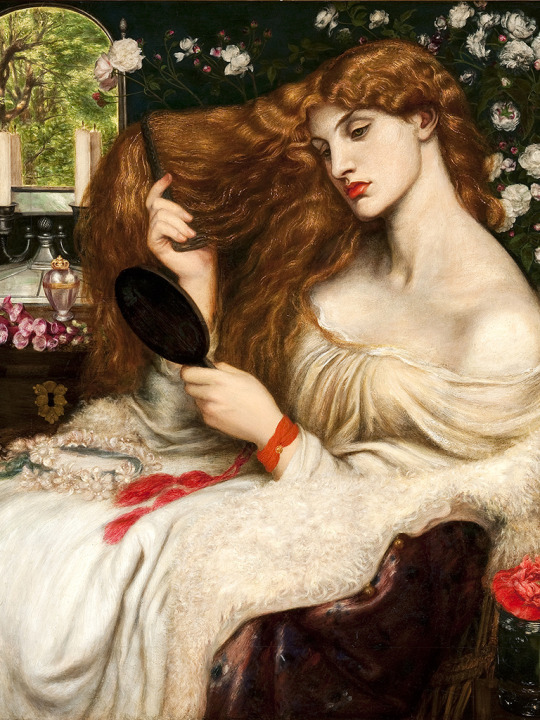
“Lady Lilith”
Painter: Dante Gabriel Rossetti Style: Pre-Raphaelite Brotherhood, Aestheticism, Oil Year: 1866-73 Themes: Beauty, Youth, Mythology Notes: Lady Lilith is an oil painting by Dante Gabriel Rossetti first painted in 1866–1868 using his mistress Fanny-Cornforth as the model, then altered in 1872–73 to show the face of Alexa Wilding. The subject is Lilith, who was, according to ancient Judaic myth, "the first wife of Adam" and is associated with the seduction of men and the murder of children. She is shown as a "powerful and evil temptress" and as "an iconic, Amazon-like female with long, flowing hair."
Rossetti overpainted Cornforth's face, perhaps at the suggestion of his client, shipping magnate Frederick Richards Leyland, who displayed the painting in his drawing room with five other Rossetti "stunners." After Leyland's death, the painting was purchased by Samuel Bancroft and Bancroft's estate donated it in 1935 to the Delaware Art Museum where it is now displayed.
The painting forms a pair with Sibylla Palmifera, painted 1866–1870, also with Wilding as the model. Lady Lilithrepresents the body's beauty, according to Rossetti's sonnet inscribed on the frame. Sibylla Palmifera represents the soul's beauty, according to the Rossetti sonnet on its frame.
A large 1867 replica of Lady Lilith, painted by Rossetti in watercolor, which shows the face of Cornforth, is now owned by New York's Metropolitan Museum of Art. It has a verse from Goethe’s Faust as translated by Shelley on a label attached by Rossetti to its frame:
"Beware of her fair hair, for she excells All women in the magic of her locks, And when she twines them round a young man's neck she will not ever set him free again."
More: Lady Lilith
5 notes
·
View notes
Text

Fanny Cornforth I Karen Jones (active 2010) Beecroft Art Gallery
4 notes
·
View notes
Photo
He clearly had a type: Lizzie Siddal and Fanny Cornforth.
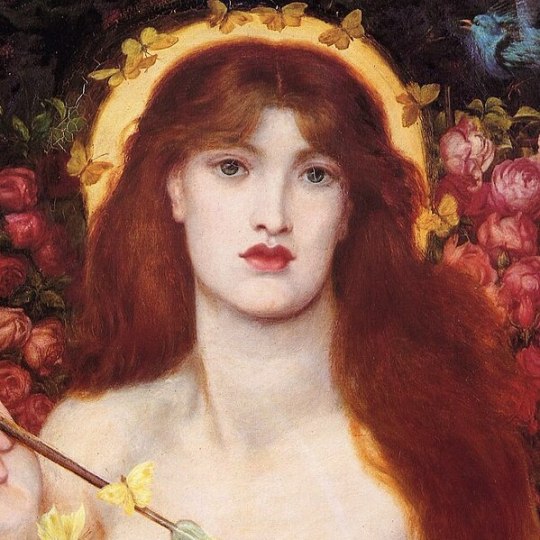
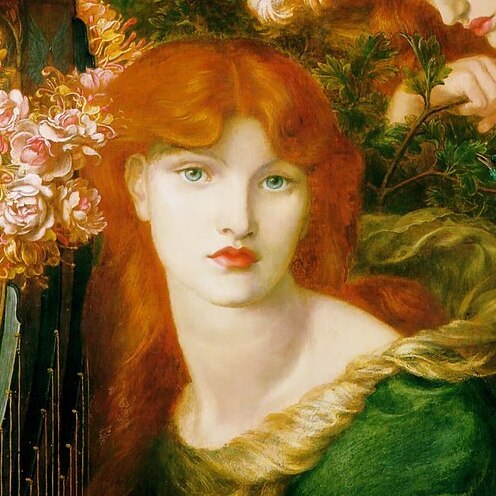
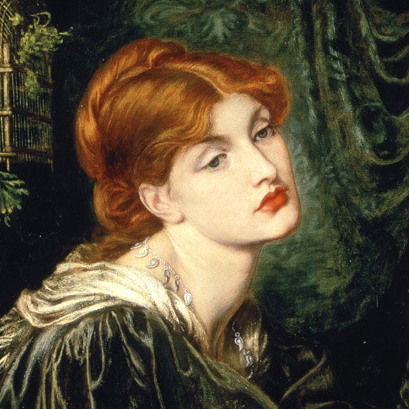

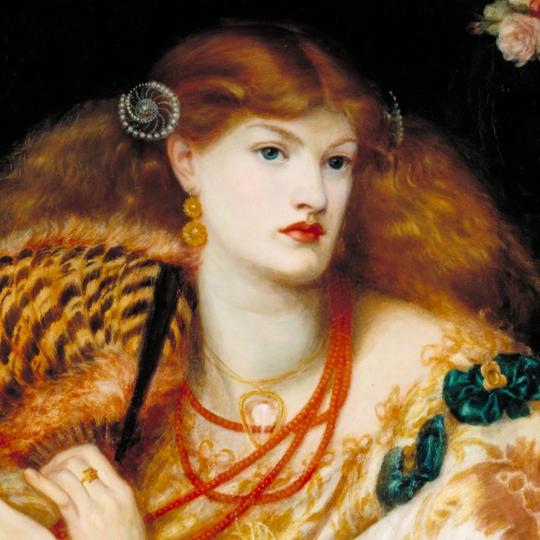
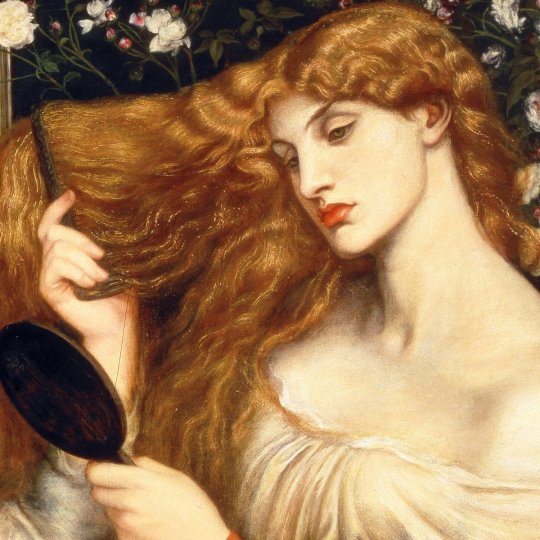
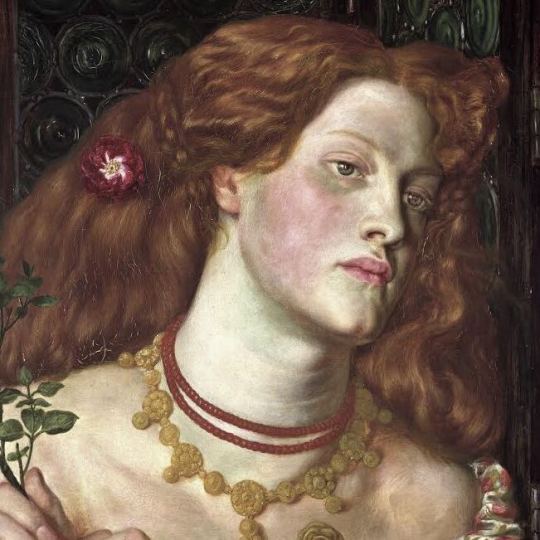
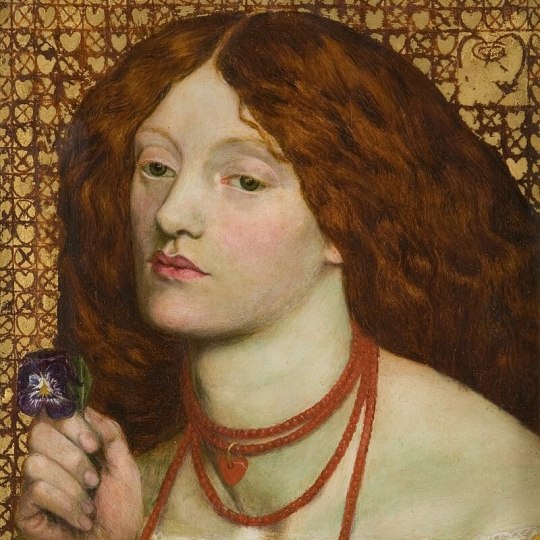

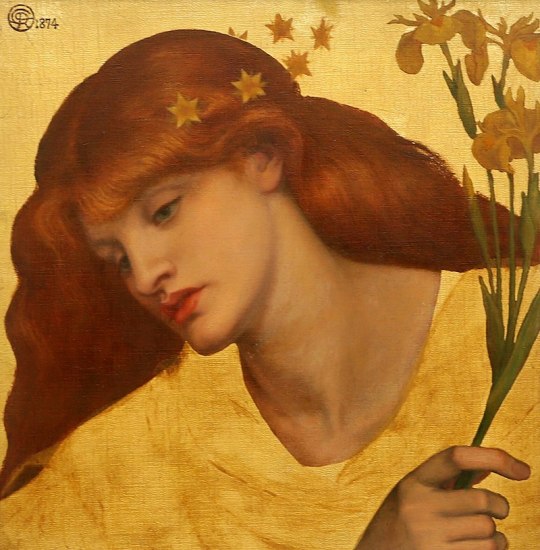
Dante Gabriel Rossetti + red hair
#dante gabriel rossetti#art#art details#pre raphaelite#19th century#women in art#female beauty in art
3K notes
·
View notes
Text
Dante Gabriel Rossetti: Ein Porträt des Präraffaeliten-Meisters
Dante Gabriel Rossetti (12. Mai 1828 – 9. April 1882) war eine zentrale Figur der Präraffaeliten-Bewegung und hinterließ ein beeindruckendes Erbe als Dichter und Maler. Seine Werke zeichnen sich durch eine einzigartige Verbindung von Poesie und Bildkunst aus, die bis heute Künstler und Literaten inspiriert.
Geboren in London als Sohn des italienischen Emigranten und Dichters Gabriele Rossetti und Frances Mary Lavinia Polidori, wuchs Dante Gabriel in einem intellektuell anregenden Umfeld auf. Seine Kindheit war geprägt von der Verehrung für die Werke Dante Alighieris, was sich in seinem Namen widerspiegelt. Rossetti erhielt eine umfassende Ausbildung, die sowohl eine klassische Schulbildung als auch Zeichenunterricht umfasste.
Im Jahr 1848 gründete Rossetti gemeinsam mit William Holman Hunt und John Everett Millais die Präraffaeliten-Bruderschaft. Diese Gruppe junger Künstler lehnte die damaligen akademischen Konventionen ab und strebte nach einer Kunst, die sich durch Detailgenauigkeit, intensive Farben und komplexe Symbolik auszeichnete. Rossettis charismatische Persönlichkeit und sein Talent sowohl in der Malerei als auch in der Dichtkunst machten ihn schnell zum Anführer der Bewegung.
Rossettis Kunstwerke sind bekannt für ihre sinnliche Schönheit und ihre mittelalterlichen Motive. Seine Gemälde wie "Beata Beatrix" und "Proserpine" zeigen eine tiefe emotionale Intensität und eine Vorliebe für mythologische und literarische Themen. Als Dichter verfasste Rossetti Werke, die von John Keats und William Blake beeinflusst waren, und seine späteren Gedichte zeichnen sich durch eine komplexe Verflechtung von Gedanken und Gefühlen aus, insbesondere in seiner Sonettfolge "The House of Life".
Rossettis persönliches Leben war eng mit seiner Arbeit verbunden. Seine Beziehungen zu seinen Musen und Modellen, darunter Elizabeth Siddal, die er heiratete, Fanny Cornforth und Jane Morris, hatten einen tiefgreifenden Einfluss auf seine Kunst. Die tragische Geschichte um den Tod seiner Frau Elizabeth und seine darauffolgenden Beziehungen spiegeln sich in der emotionalen Tiefe seiner Werke wider.
Dante Gabriel Rossetti war nicht nur ein Wegbereiter für die Präraffaeliten, sondern auch ein Vorläufer der Ästhetischen Bewegung und des Symbolismus in Europa. Seine Arbeiten inspirierten die nächste Generation von Künstlern und Schriftstellern, insbesondere William Morris und Edward Burne-Jones. Bis heute wird Rossetti als einer der bedeutendsten Künstler des 19. Jahrhunderts gefeiert.
Dante Gabriel Rossettis Leben und Werk sind ein faszinierendes Studium der Kunstgeschichte. Seine Fähigkeit, Poesie und Malerei zu vereinen, und sein Einfluss auf nachfolgende Künstlergenerationen machen ihn zu einer unvergesslichen Figur in der Welt der Kunst und Literatur.
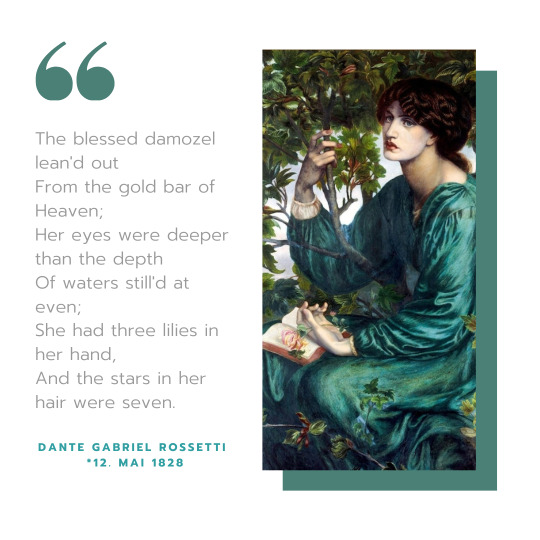
0 notes
Text

Thoughts of the Past
Artist: John Roddam Spencer Stanhope (English, 1829–1908)
Date: Exhibited 1859
Medium: Oil paint on canvas
Collection: Tate Britain, London, United Kingdom
Description
John Stanhope painted this scene in his studio, below Rossetti’s, beside the polluted River Thames. In the shabby lodging, the woman thinks of her ‘past’. Her undressed hair, loose coat and the money on the table, suggest that in the ‘present’ she must entertain men to support herself or others. A man’s glove and walking stick place the viewer in the position of one of these visitors. The model is Fanny Cornforth, a close member of the Pre-Raphaelite circle. She made her living as a sex worker, domestic servant and professional model.
#painting#pre raphaelite art#oil on canvas#female figure#river thames#boats#potted plants#woman#artwork#fine art#oil painting#window#curtains#blue robe#table#money#man's glove#narrative art#pre raphaelite brotherhood#john roddam spencer stanhope#english culture#english art#english painter#european art#19th century painting#tate britain
24 notes
·
View notes
Text
Lucy Madox Brown, Evelyn De Morgan, Mary Lizzie Macomber, Louisa Marchioness of Waterford, May Morris, Christina Rossetti, Emma Sandys, Elizabeth Siddal, and Mary Spartali Stillman were all active Pre Raphaelite artists.
Personally, I think that Elizabeth Siddal should be considered one of the founding members. She was, as a model, instrumental in creating the early success of the Pre Raphaelites. I don't think they could have done it without her.
Sophie Gengembre Anderson, Joanna Mary Boyce, Kate Elizabeth Bunce, Juliet Margaret Cameron, and Marian Collier were artists all closely associated with the Pre Raphaelites.
Marianne Stokes and countless others, while not Pre Raphaelites themselves, were influenced by the movement.
It's a shame that the men get most of the attention, because there are so many women who were very much involved. They weren't all only models. But even those who were, like Fanny Cornforth, Effie Grey, Annie Miller, Jane Morris and Alexa Wilding, are important members of the movement.
The Pre Raphaelites wouldn't have existed without women.
forever remembering that person on Twitter who said Pre-Raphaelite art was the most misogynistic art ever and then went on to claim that there were no female Pre-Raphaelite artists- only models and "hangers-on"
(spoiler there were several female Pre-Raphelites)
(many were also models for the male artists but like. they did the Pre-Raphaelite Painting. they were Pre-Raphaelite Painters)
(does Marie Spartali Stillman mean nothing to you people. I've seen you sharing Marianne Stokes' "Death and the Maiden." Do You Even Alexa Wilding, Bro)
#the Lady speaks#people are so weird about the Raphaelites#and I don't understand it at all#pre raphaelites#pre raphaelite muses#muses#art history
105 notes
·
View notes
Photo

Photograph of Fanny Cornforth, 1863
236 notes
·
View notes
Text
Why did you not come yesterday evening? This is the third day that I am absolutely alone.
An old Rhinoceros was nasty last night & his horn is wet with tears which he has shed on the subject. He wants a good Elephant to come down as soon as possible & he will give it something to amuse it.
GOOD ELEPHANT DO COME DOWN OLD RHINOCEROS IS UNHAPPY DO COME TO OLD RHINOCEROS.
Dante Gabriel Rossetti's notes (circa mid-1870s) to Fanny Cornforth
Ever since the two of them started gaining weight in their thirties and forties they affectionately nicknamed each other "Elephant" and "Rhinoceros"
6 notes
·
View notes
